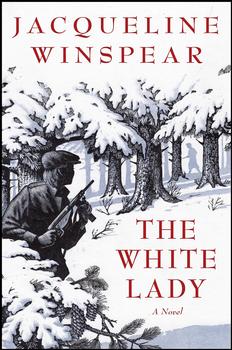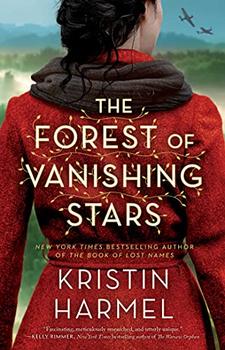Summary | Excerpt | Reviews | Beyond the book | Read-Alikes | Genres & Themes | Author Bio

The Amber Shadows sweeps readers into the realm of World War II-era Britain where Honor "Honey" Deschamps, aged 24, has been posted to top-secret Bletchley Park where she works as a typist with a team of codebreakers. Most of Honey's colleagues are hiding personal secrets, as they work with life-and-death intensity during wartime. After a charismatic stranger, Felix, delivers a mysterious parcel to Honey, this fast-paced mystery spins through many twists and turns.
In late 1942, when this novel takes place, stakes have never been higher in Europe. Air raids happen with daily intensity. German U-boats dominate the Atlantic, interrupting allied supply lines. These U-boats communicate using ciphers, which the allies haven't been able to crack. Much depends on the secret cadre of cryptanalysts and Hut 6 Typex operators like Honey who decipher wireless messages intercepted by allied spies. Life at Bletchley happens in deepest secrecy. If the Nazis learn that the allies can read their ciphers, they will change their encryption system again.
Suspense is built into The Amber Shadows around one of the world's most legendary unsolved mysteries: During the 1941 German invasion of Russia, the original Amber Room disappeared from St. Catherine's Palace in Leningrad and, to this day, has never been found. There are rumors that the Nazis disassembled and then stole the "eighth wonder of the world", while others say bombing raids destroyed it. Either way, Ribchester deploys Honey into the heart of this true-history mystery. While walking home alone from the cinema, she bumps into Felix and is immediately attracted to him. When Felix delivers a parcel addressed to her with Cyrillic script and postmarked Leningrad, she is intrigued. A piece of carved amber wrapped inside compels Honey to quest for answers about the Amber Room. And because stories told by Honey's elder brother Whitington – Dickie – cast their father as a musician who returned to his native Russia during Honey's infancy, the parcel also makes her begin to investigate her long-lost birth father. Soon she receives more mysterious pieces of amber and notices an evolving code in them.
Could her father be sending messages via shards of amber? Or is he attempting a family reunion or perhaps something more vital to the war effort? Concealing secrets and communications with foreigners (or even having a foreign surname) are matters of suspicion, possible treason. Yet Honey's desire to know the truth about her father and her family's ambiguous past motivates her to risk everything to chase after clues. No spoilers here: Honey discovers more (and less) than she'd imagined when she finally deciphers the secrets of her amber.
Yet, in The Amber Shadows not all danger is caused by foreign enemies and possible treason. Nightly blackouts and winter weather lend a shadowy, noir tone to the book, emphasized by round-the-clock, mentally stressful shift work at Bletchley. In a riveting subplot, Honey's close friend Moira is sent away. It's not certain whether it's due to mental breakdown, or because she blows the whistle on a rumored gender wage gap, or as retribution for Moira's ill-fated affair with a married American pilot.
The Amber Shadows explores women's expanding social roles during WWII. The Bletchley Park women live within an isolated, secret sisterhood (See Beyond the Book). They share romantic woes, improvise makeup and fashion fixes born of wartime scarcity, and fortify each other in pursuit of victory over the ever-advancing German forces. Flirtations with cryptanalysts and dance parties with Yankee fly-boys enhance the narrative tension: "The Military Policeman held his hand out for her card. In the spillage of light from his torch, she became aware of footsteps coming and going all around them, soft as insects in the night's foliage. They had stumbled into the ecosystem of the Bletchley midnight changeover and there were no places to hide, no places to kiss."
One of the shortfalls in the novel is that Dickie never appears center-stage; instead the sibling bond is revealed via flashbacks. This might have been better rendered in real-time scenes with Honey, rather than confined to a confusing prologue. Dickie's motivations are never fully explored; he is called a conscientious objector and that would have been fascinating to read more about. Still, Ribchester has won literary prizes including a Scottish Book Trust New Writers Award, and it is clear why. Compelling historical details vibrate through each chapter, and her prose shimmers with nuances unique to Britain and that era: "The seafront had been sandbagged. Battlements, coloured slush by the tide, sagged in piles, some crusted over with seaweed in tiny ragged lines. As the truck rounded a bend in the road the fragile white stucco of the seafront houses came into view, like brittle icing on a wedding cake; a cake that couldn't exist any more now rationing had put paid to sugar."
Those who worked at Bletchley Park were sworn to secrecy for decades after the end of the war, which allows Ribchester some creative latitude – that said, she braids a compelling mystery with historically accurate details. I'd love to read a sequel to The Amber Shadows featuring further adventures of Honey and Moira. When the novel ends, the war is far from over.
![]() This review
first ran in the September 20, 2017
issue of BookBrowse Recommends.
This review
first ran in the September 20, 2017
issue of BookBrowse Recommends.

If you liked The Amber Shadows, try these:

by Jacqueline Winspear
Published 2024
The White Lady introduces yet another extraordinary heroine from Jacqueline Winspear, creator of the best-selling Maisie Dobbs series. This heart-stopping novel, set in Post WWII Britain in 1947, follows the coming of age and maturity of former wartime operative Elinor White—veteran of two wars, trained killer, protective of her anonymity&#...

by Kristin Harmel
Published 2022
The New York Times bestselling author of the "heart-stopping tale of survival and heroism" (People) The Book of Lost Names returns with an evocative coming-of-age World War II story about a young woman who uses her knowledge of the wilderness to help Jewish refugees escape the Nazis—until a secret from her past threatens everything.
The dirtiest book of all is the expurgated book
Click Here to find out who said this, as well as discovering other famous literary quotes!
Your guide toexceptional books
BookBrowse seeks out and recommends the best in contemporary fiction and nonfiction—books that not only engage and entertain but also deepen our understanding of ourselves and the world around us.